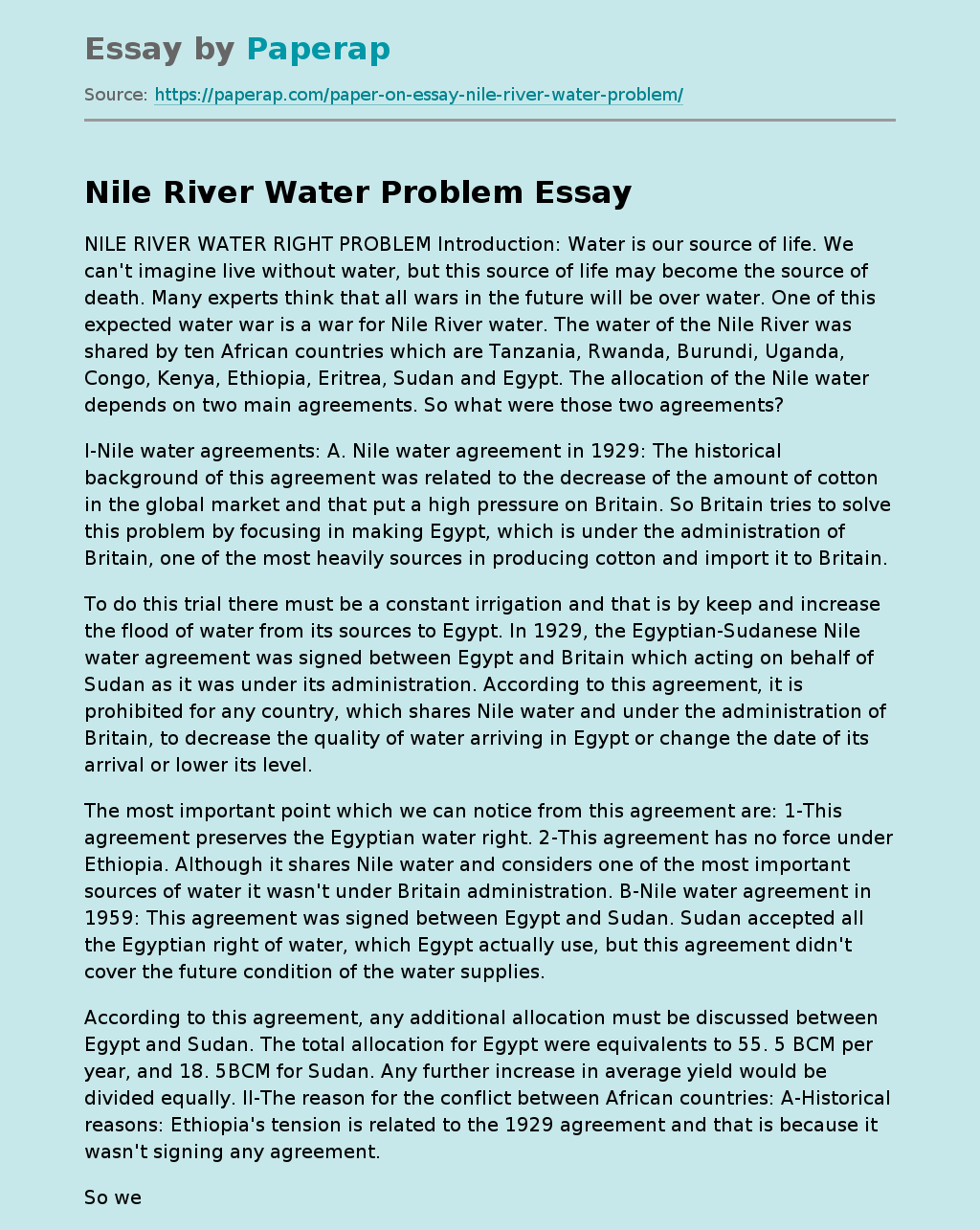The following example essay on “Nile River Water Problem” tells about the struggle for the water resources of the Nile between Tanzania, Rwanda, Burundi, Uganda, Congo, Kenya, Ethiopia, Eritrea, Sudan, Egypt. The essay provides possible ways to resolve the conflict.
Water is our source of life. We can’t imagine live without water, but this source of life may become the source of death. Many experts think that all wars in the future will be over water. One of this expected water war is a war for Nile River water.
The water of the Nile River was shared by ten African countries which are Tanzania, Rwanda, Burundi, Uganda, Congo, Kenya, Ethiopia, Eritrea, Sudan and Egypt. The allocation of the Nile water depends on two main agreements. So what were those two agreements?
Nile water agreements: Nile water agreement in 1929: The historical background of this agreement was related to the decrease of the amount of cotton in the global market and that put a high pressure on Britain.
So Britain tries to solve this problem by focusing in making Egypt, which is under the administration of Britain, one of the most heavily sources in producing cotton and import it to Britain.
To do this trial there must be a constant irrigation and that is by keep and increase the flood of water from its sources to Egypt. In 1929, the Egyptian-Sudanese Nile water agreement was signed between Egypt and Britain which acting on behalf of Sudan as it was under its administration. According to this agreement, it is prohibited for any country, which shares Nile water and under the administration of Britain, to decrease the quality of water arriving in Egypt or change the date of its arrival or lower its level.
The most important point which we can notice from this agreement are:
- This agreement preserves the Egyptian water right.
- This agreement has no force under Ethiopia.
Although it shares Nile water and considers one of the most important sources of water it wasn’t under Britain administration. B-Nile water agreement in 1959: This agreement was signed between Egypt and Sudan. Sudan accepted all the Egyptian right of water, which Egypt actually use, but this agreement didn’t cover the future condition of the water supplies. According to this agreement, any additional allocation must be discussed between Egypt and Sudan. The total allocation for Egypt were equivalents to 55. 5 BCM per year, and 18. 5BCM for Sudan. Any further increase in average yield would be divided equally.
Ethiopia’s tension is related to the 1929 agreement and that is because it wasn’t signing any agreement. So we can say that this problem may be back to the time of colonial conquest, when Italy acted on behalf of Ethiopia and signed a lot of agreements which affect Ethiopia right of water. All other African countries, which share the Nile water, tension is because of the Egyptian veto right to prevent any construction of any project which would affect Egypt interest and they believe that this veto right preventing them from benefit from the Nile.
The present conflict on the Nile water results from several issues. First, the highly increase of the population on African countries. For example, a country as Ethiopia its population will be increase from 72 million to 171 million in 2050 and those people need fresh water, food, and power.
Second, the African countries try to improve their economy and to attract investment, but there is no way for this purpose without water. The third and the most important reasons for this conflict is related to Camp David negotiation between Egypt and Israel and according to this negotiation President Anwar Al-Sadat offered to give Israel 365 MCM of water per year in exchange for the solution of Palestinian problem. Although Israel didn’t agree the African countries began to think about selling the Nile water and gain a lot of money.
The solution of the Nile problem: A. Respect of international agreements and laws All African countries must respect all international agreements, treaties, and laws. According to Nile River agreements, Egypt has the veto rights to prevent all the projects which affected its right so all African countries must respect this agreement and didn’t build any Dams or projects before the approval of Egypt.
Also, all African countries must respect the human rights of water and not to prevent water from reaching to any person. All the international charters and treaties provide the right of human to drink fresh water and to use it in any filed of life for example article 14 of the African charter on the rights and welfare of the child (1990), article 24 of the convention on the rights of the child (1989), and article 25 of the universal declaration of human rights are insist on these rights.
Negotiation is one of the most important legal solutions to any problem and all the African countries must negotiate to satisfy its need and to achieve its goals. The negotiation must be based on cooperation. The cooperation may be in any field of life, so it may be in agriculture field or industrial field. This cooperation may be need the help of third party like World Bank or International Monetary fund and this help can’t be achieved unless all country agree on the basis.
The most important legal advice for Egypt in negotiation is not to negotiate with all countries at the same time. Egypt must negotiate with each country alone especially Ethiopia because the water comes from it consists 95% of the water which Egypt depends on. By negotiate with each country alone you can satisfy her needs and achieve your goals because any countries has different need and you can’t satisfy all other’s need at the same time.
Negotiation as a legal way to solve the problem may be failed and in this time we can find ourselves in a huge war. So we can see in international arbitration a good example to solve this problem. There are two benefits from arbitration; the first one is based on the freedom of the countries to choose its arbitrator and this may be consider as second step of negotiation, second all countries may accept the decision easily and prevent war. In conclusion, all countries must share water and cooperate to prevent wars.
Nile River Water Problem. (2019, Jun 20). Retrieved from https://paperap.com/paper-on-essay-nile-river-water-problem/

